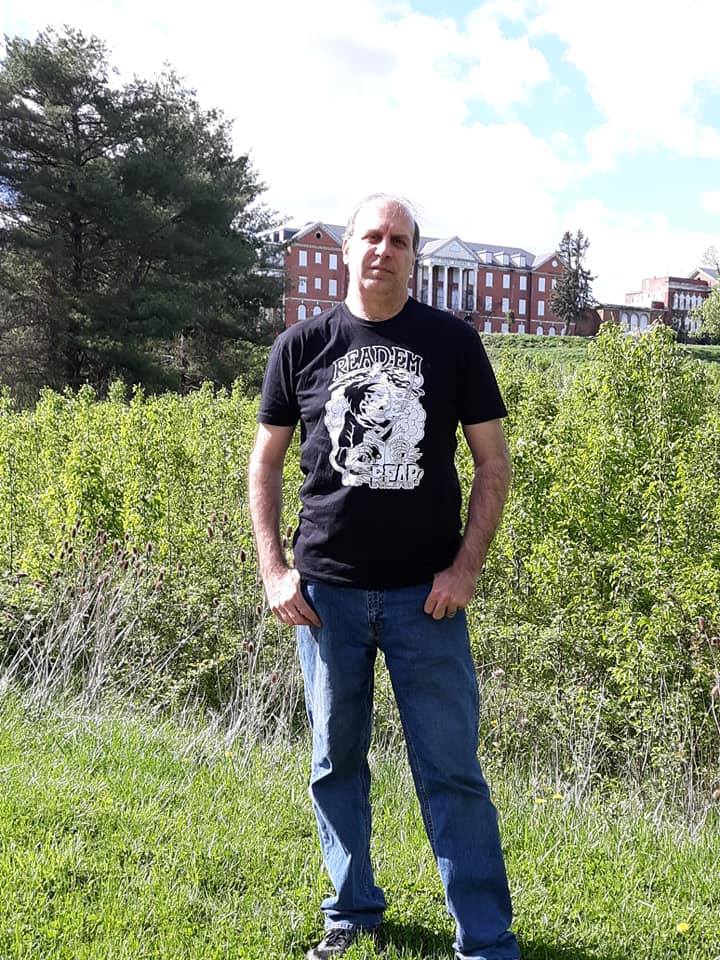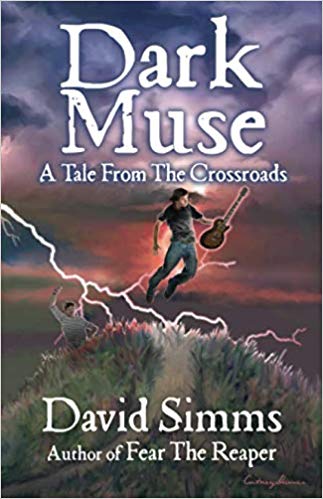
David Simms lives in the Shenandoah Valley of Virginia after surviving life in NJ and Massachusetts with his family, three furballs, and one ghost. When not writing to earn grocery money, he teaches English, Psychology, and Creative Writing. His current side gigs include working as counselor for teens, guitar teacher, ghost tour guide, book reviewer, and guitarist for a sketchy authors’ band. He sold his first story back in 2003 and has placed short stories in various anthologies, along with scribbling on walls everywhere since. Fear The Reaper and Dark Muse are his first two novels.
Tell me about your writing process: schedule, environment, inspirations, magic spells, etc.
My writing process is an amalgamation of chaos. I fight for the blank spots between the minutes. Waking up at dawn, you’d think I might have a few minutes, but a crazed seven-year-old senses my every move and is there to thwart my muse, often smothering her until he passes out that evening. I teach high school which means I may have a planning period or might have a minute to run to the bathroom. When my classes are testing or writing, I might sneak a few paragraphs or a page. Mostly though, I’m a night owl, no matter how hard I try to heed the advice of my heroes and be creative before the sun rises. My muse goes bonkers once the moon rises for some reason. I prefer to write on the back porch in spring and summer, while in colder weather, I hide in my man-cave/library. I also keep random notebooks everywhere. I constantly text myself with thoughts about characters or plot twists. When does the inspiration hit? When I’m on the move—whether it’s on the treadmill or driving. I don’t recommend taking notes in either situation, but something kickstarts that muse who loves to screw with me. As for spells, I do live on the top of a big hill. Plenty of room for shallow graves.

Walk me through your submission / publishing process from “final” draft to final product, including who does what when, and marketing that you do as the author.
I’ve been extremely fortunate to work with Crossroad Press for two novels. David Wilson, owner and CEO of the publishing company, set me up with two kickass editors who took that “final” draft and forged something so much better out of it. They allow great flexibility for the covers, which can sometimes make or break a book and walked me through whatever I didn’t know—which is plenty.
As for marketing, that’s when it all gets ugly (for authors). Hunting down blurbs is akin to sliding down a cheese grater for anyone with a soul. It’s so tough to ask for, especially when you realize writers are so swamped. Thankfully, I’ve been so lucky to have people such as Heather Graham, Elizabeth Massie, Steve Berry, Brad Meltzer, and others say a few kind words. That alone had me walking on air. I’m not a business guy, but playing in a band where romance writers were the core audience (victims?), I learned a ton from them about how to publicize one’s work, how to utilize social media without being too annoying, and luring jaded readers to one particular book out of thousands of others. In my experience, nobody markets better than romance authors. Finding that niche is key if you want to break out of the horde.
Talk about your support system online and IRL; who are your biggest cheerleaders?
A writers’ support system is more than a lifeline. It’s a therapist, best friend, tackling dummy, and mentor, all rolled up into one—sometimes into one person. Again, I’ve been blessed with having some of my favorite writers give me tips along the way, often steering me clear of potholes I never knew were there. Thank you F. Paul Wilson, Tom Monteleone, Deb Leblanc, David Morrell, and K.J. Howe—you’ve helped that last brain cell off the ledge many times over the years, along with countless others.
I’ve been part of a few writers’ groups with varying success and highly recommend it. Right now, I run a monthly workshop where I’m teaching various topics—yet learn just as much as I teach. The group has become strong allies and friends even though we’re incredibly different. My immediate family has helped, always, yet I’ve been just as bewildered by who doesn’t read my novels as who does. It’s a sobering experience to find a close friend won’t read it, yet a coworker shares it all over the state. Many times, logic does not apply to art.
Finally, my students have been amazing—they let me know their true feelings, which I love and need. If something sucks, they’ll tell me!

How does life influence your writing and vice versa?
Good question! Having a couple of degrees in psychology helps as I often find myself in odd situations. I started off my career as a behaviorist in a school where kids typically were headed to residential placements, juvie, or on the way back…not all, but many. I saw some frightening and very sad things that taught me plenty about the human condition, sometimes about the horrors of the parents who watched them. I made sure to travel plenty around the country, partially to absorb the landscapes of National Parks (learning to write them in descriptions that don’t go on for chapters is a great task!) or to learn the people of each region. Expanding my repertoire of body language, dialect, and customs was invaluable.
Then there was the day I discovered I was living less than a mile from one of the darkest secrets in American history. That became Fear the Reaper. Finally, music worms its way into most of my work, either overtly in Dark Muse, or in themes or minute threads.
What do you love most about your creativity?
I love everything about my creativity. It’s yanking it from my head and getting to the finished product that’s the problem. Once I can get past my own insecurities and anxiety about the novel (thinking about editing, publishing, a dream deal or agent, or if someone will actually enjoy it), it’s a fun thrill ride. There’s a song by The Foo Fighters I often think about after writing a story or song—“Something From Nothing.” It amazes me that artists of any media can see, hear, or sense something that never existed before and with some bit of magic, it becomes a reality. I explored this in Dark Muse (along with where songs come from) as I’ll never get used to that moment when a cool idea erupts, germinates into a story or character, and then when I feel I’m the most terrible writer in the world, I watch my fingers bang out something that I can’t figure where the hell it came from. Then there are those days when I can’t spell for my life or write a sentence that my kid wouldn’t spit on. It’s magic—until it’s work.
Connect with David: